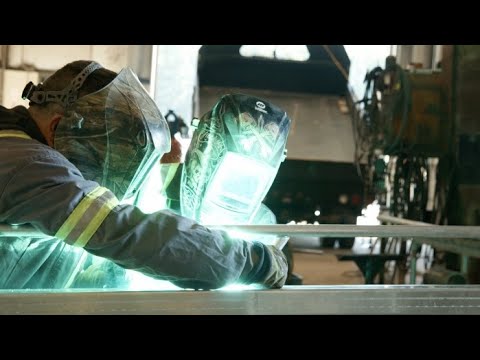Career Overview
Welders and related machine operators operate welding equipment to weld ferrous and non-ferrous metals. A welder can be either an artisan or a precision production worker. This group also includes machine operators who operate previously set up production welding, brazing and soldering equipment. The great variety of work, techniques and work settings offered by this occupation may be appealing to those seeking variety in their day-to-day activities.
People in this occupation:
- Are employed by companies that manufacture structural steel and platework, boilers, heavy machinery, aircraft, ships and other metal products, and by welding contractors and welding shops
- May be self-employed
- Should have good manual dexterity, analytical ability and a high level of design sense, as well as strong technical and artistic interests
- Should have a sound understanding of computerized machinery and be capable of following instructions precisely
Job Titles
Duties
- Read and interpret blueprints or welding process specifications
- Operate manual or semi-automatic welding equipment to fuse metal segments using processes such as:
- Gas tungsten arc welding (GTAW)
- Gas metal arc welding (GMAW)
- Flux-cored arc welding (FCAW)
- Plasma arc welding (PAW)
- Shielded metal arc welding (SMAW)
- Oxy-acetylene welding (OAW)
- Resistance welding
- Submerged arc welding (SAW)
- Operate manual or semi-automatic flame-cutting equipment as well as brazing and soldering equipment
- Operate brakes, shears and other metal straightening and bending machines
- Repair worn parts of metal products by welding on extra layers
Welding, brazing and soldering machine operators:
- Operate previously set up welding machines, such as spot, butt and seam resistance or gas and arc welding machines to fabricate or repair metal parts
- Operate previously set up brazing or soldering machines to bond metal parts or to fill holes, indentations and seams of metal articles with solder
- Start up, shut down, adjust and monitor robotic welding production line and assist with the maintenance and repair of welding, brazing and soldering equipment
- Adjust welding heads and tooling according to work specifications
Special duties
Welders may specialize in particular types of welding, such as custom fabrication, ship building and repair, aerospace precision welding, pressure vessel welding, pipeline construction welding, structural construction welding, or machinery and equipment repair welding.
Earnings
Earnings is income that workers receive in exchange for their labour. Depending on the type of employment, earnings can be in the form of wages (hourly), salaries (fixed monthly or annual) or self-employed earnings.
Work Environment
# Workers Employed
8,790% Employed Full Time
59%Most welders and related machine operators work 40 hours per week in factories and machine shops and on construction sites. Those working at mills, factories and processing plants may work nights and weekends, or do shift work.
Machine welders almost always work in controlled factory environments. Those working in manufacturing may work at sawmills, pulp and paper mills or mines. The Oil and Gas industry hires welders to work on oil and gas rigs and pipelines.
Welders and related machine operators who work in Construction or in the Oil and Gas industry often work outdoors in various weather conditions. They may also be required to work from scaffolds or platforms. Other potential hazards to welders include exposure to fumes, intense light and burns, so they take safety precautions to avoid injury.
Welders in the Construction industry often relocate to different job sites, sometimes in remote regions. Short periods of unemployment between projects are also common.
Career Pathways
With experience and additional training, welders can move into more senior positions. These include supervisory roles such as welding inspector, foreman or supervisor. They may also transfer their skills to related trades like boilermaking.
Some experienced workers may also become self-employed and work as a contractors or open their own repair shops.
Occupational Interests
It’s important to understand what kinds of occupations align with your interests.
For more about occupational interests visit Skills for the Future Workforce > Characteristics.
Here are the top occupational interest(s) for this career profile:
Education, Training and Skills
Completion of secondary school is typically required. Welders do not need trade certification to work as a welder in B.C. However, there are three levels of welder certification available in B.C.: levels C, B and A. Level C certification is a prerequisite for level B certification, which is a prerequisite for level A certification.
Each certification level may be completed in a modular format or through a formal apprenticeship. The modular format requires more in-school training than the apprenticeship format for all levels of certification. Each level takes one year to complete and requires a mix of documented training and work experience.
Apprenticeships can be started in secondary school, through entry-level training at colleges and technical institutes, or by direct entry, where workers find a sponsor employer who is willing to participate in the program. For more information, see SkilledTradesBC's website at https://skilledtradesbc.ca.
Interprovincial Red Seal Certification is available for welder levels B and A. Those who complete level C will receive a SkilledTradesBC Certificate of Qualification.
Levels C, B and A may be challenged with 2,700, 5,400 and 7,020 hours, respectively, of documented directly related work experience. Level C certification is required before challenging level B certification. Applicants for challenge tests must pass both a written and practical examination.
Welders who are certified for that occupation by a regulator elsewhere in Canada can apply for the same certification from the regulator in B.C. Under the terms of the Canadian Free Trade Agreement (CFTA), most applicants who are transferring their credentials from elsewhere in Canada will not be required to complete additional training or testing. However, the B.C. regulator may ask applicants to provide further information such as a letter of good standing, references, or criminal record check.
For those who trained outside of Canada and never received certification from any Canadian jurisdiction, a full assessment is likely needed. Most occupational regulators have a process for assessment and recognize internationally trained applicants.
Contact SkilledTradesBC and/or Technical Safety BC for details on how to apply for certification in B.C.
For information about labour mobility in Canada, visit www.workersmobility.ca.
View a list of Professional Regulatory Authorities in B.C.
Trades training resources
Visit our trades training page at www.workbc.ca/trades to learn about apprenticeship and trades training in B.C.
Education programs in B.C.

Top Skills
Every job calls for a certain set of skills. Knowing those skills is the first step in finding a good career fit.
Here, you will find the 10 most relevant workplace skills. Some are more important to achieving success in a certain career than others. These skills may come naturally to you or you may need to gain them through education, training and experience.
See the list of work-related skills below, ranked in order of importance for this career. Check out the list and see if this career matches your skills—take that first step!
Watching gauges, dials or other indicators to make sure that a machine is working properly.
Keeping track of and assessing your performance, other individuals, or organizations to make improvements or take corrective action.
Using logic and reasoning to identify the strengths and weaknesses of alternative solutions, conclusions or approaches to problems.
Controlling operations of equipment or systems.
Considering the relative costs and benefits of potential actions to choose the most appropriate one.
Giving full attention to what other people are saying, taking time to understand the points being made, asking questions as appropriate, and not interrupting at inappropriate times.
Talking to others to share information effectively.
Being able to solve novel, ill-defined problems in complex, real-world settings.
Understanding written sentences and paragraphs in work-related documents.
Conducting tests and inspections of products, services or processes to evaluate quality or performance.
Labour Market Statistics
Discover data, facts and information that have been gathered and analyzed. Learn about the characteristics of the economy and labour market in B.C.
Employment
Find out about employment types and trends by region and industry.
Employment
8,790Employment by Region







| Region | Employment | % Employment of this Occupation |
|---|---|---|
| Cariboo | 545 | 6.2% |
| Kootenay | 530 | 6.0% |
| Mainland/Southwest | 4,365 | 49.7% |
| North Coast and Nechako | 335 | 3.8% |
| Northeast | 275 | 3.1% |
| Thompson-Okanagan | 1,495 | 17.0% |
| Vancouver Island/Coast | 1,245 | 14.2% |
Labour Market Outlook
The B.C. Labour Market Outlook is a 10-year forecast of the expected supply and demand for labour in the province. It’s usually updated every year. The purpose is to provide British Columbians with the knowledge to make informed decisions on careers, skills training, education and hiring.
Forecasted Job Openings (2025-2035)
3,110Forecasted Job Openings
Forecasted Employment Growth Rate
Composition of Job Openings
Job Openings by Region (2025-2035)







| Region | Job Openings | Avg. Annual Employment Growth |
|---|---|---|
| Cariboo | 130 | 0.0% |
| Kootenay | 140 | 0.4% |
| Mainland/Southwest | 1,820 | 1.1% |
| North Coast and Nechako | 80 | 0.3% |
| Northeast | 80 | 0.8% |
| Thompson-Okanagan | 430 | 0.4% |
| Vancouver Island/Coast | 420 | 0.8% |
Industry Highlights
Learn about the opportunities in B.C.'s major industries, including employment trends, earning potential, locations of work and more.
Forecasted Job Openings by Industry
| Industry | Job Openings (2025-2035) |
|---|---|
| Manufacturing | 1,220 |
| Repair, Personal and Non-Profit Services | 900 |
| Construction | 420 |
| Mining and Oil and Gas Extraction | 200 |
| Wholesale Trade | 110 |
Insights from Industry
Technological improvements, such as increased automation, are leading to productivity improvements. Increased worker output will decrease the number of new jobs created. However, technological improvements should increase the demand for highly skilled welding machine setters and operators.
Welders on construction projects and those who repair equipment will not be affected by technological changes to the same extent as those in the Manufacturing industry because their jobs are not easily automated.
Construction-related manufacturing, such as architectural and structural metal fabrication, will likely offer the greatest demand for welders and related machine operators over the next few years. However, the phasing out of older saw and pulp mills and increased use of automation within the remaining mills will limit employment opportunities for welders and related machine operators in the wood product manufacturing sector.
Resources
-
Association for Mineral Exploration British Columbia (AME BC)www.amebc.ca
-
British Columbia Construction Association (BCCA)www.bccassn.com
-
BuildForce Canadawww.buildforce.ca/en
-
Canadian Welding Bureau (CWB) – Jobswww.weldingindustryjobs.org
-
Careers in Constructionwww.careersinconstruction.ca
-
Mechanical Contractors Association of British Columbia (MCABC)www.mcabc.org
-
Millwrights Local Union 2736www.millwrights2736.com
-
Mining Association of BC – Job Boardwww.mining.bc.ca/job-board
-
Mining Association of British Columbia (MABC)www.mining.bc.ca
-
Skilled Trades Employment Program (STEP)www.stepbc.ca
-
SkilledTradesBCskilledtradesbc.ca/
-
Trades Training BCwww.tradestrainingbc.ca








